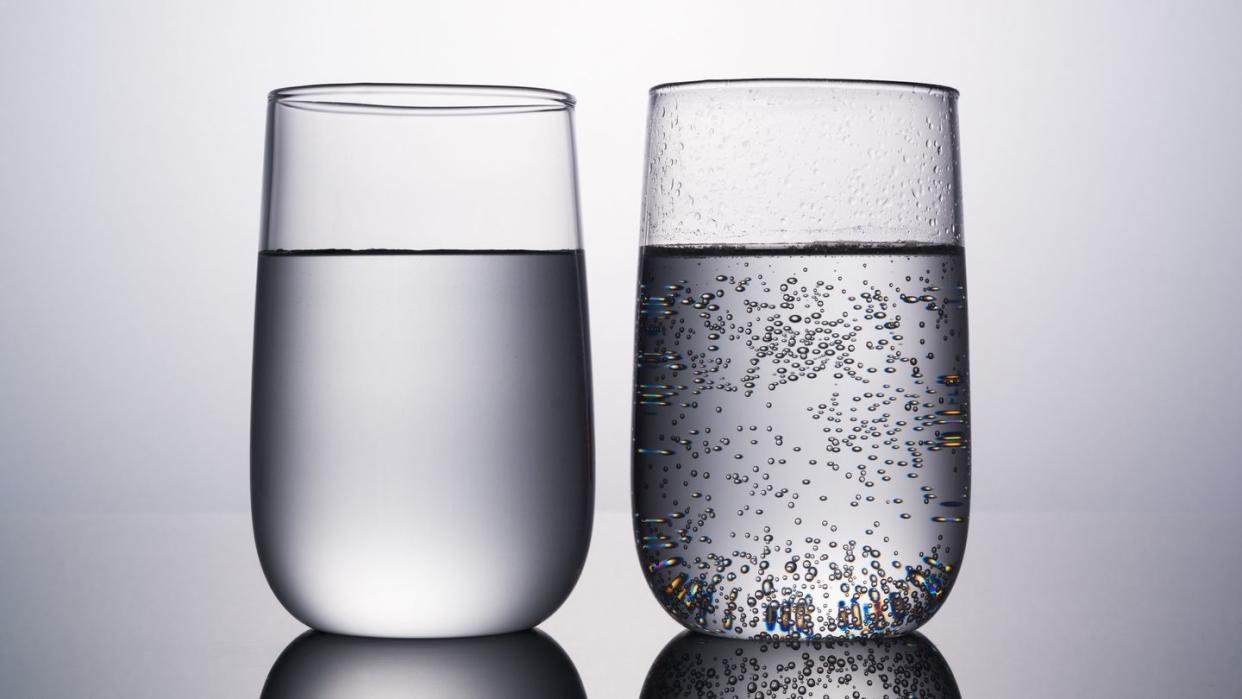The Dark Truth About Drinking Seltzer

"Hearst Magazines and Yahoo may earn commission or revenue on some items through these links."
In this enlightened era of health-conscious consumers and wellness drinks, seltzer has been bubbling up. Flavored or plain, bottled or canned: everyone has their favorite brand.
But what if I told you that seltzer wasn’t actually that great for you? It can be bad for your teeth and the rest of your body (not to mention your bank account). Here are five reasons you need to stop buying seltzer, stat.
1. It can damage your teeth.
In its most basic form, seltzer is carbonated water. According to Kim Yawitz, a registered dietitian and gym owner in St. Louis, Mo, “during this carbonation process, the carbon dioxide molecules react with water molecules to form carbonic acid.” Or, as a 2018 study put it, with that “high degree of carbonation” comes a “high level of acidity.”
There’s no denying it: seltzer is more acidic than plain water. With a pH that typically falls between 4.18 and 5.87, it’s acidic enough to eat away at your teeth if it’s heavily consumed over several years. As Yawitz says, “drinking large amounts of it could erode teeth enamel, leaving you more susceptible to cavities.” So if you think switching from soda to your SodaStream will make your dentist happy, think again.
2. It makes you feel bloated.
We all love that fizz, but did you ever notice that shortly after drinking a can of seltzer, your stomach feels a little tight? According to Jessica Cording, registered dietitian, health coach, and author, the bubbles we love so much are actually gas. And when that gas enters our bodies, the higher temperatures of our body cause it to expand, often making us feel uncomfortably full. Additionally, Cording says that even if we burp some of it up, “it’s also possible that some will remain in the stomach, which can contribute to bloating.” A bloated stomach with a side of burps? No thank you. And do you have acid reflux? Seltzer tends to make heartburn and indigestion feel so much worse.
3. It’s expensive.
We live in a society where the price of eggs seems to go up every week and water—the plain version that comes from the tap—is free. With the cost of living skyrocketing every year, do we really need to be spending $6 to $7 for a case of water that’s had air pumped into it?
Sure, $7 doesn’t seem too crazy (what’s that, the cost of your daily triple-shot latte at Starbucks?) but like everything else, it adds up. Wouldn’t you rather be spending your money on something else instead of wasting it on a product that you can get by literally turning on your kitchen sink?
4. It can contain hidden sodium and other chemicals.
Seltzer might be as simple as water plus carbon dioxide, but most sparkling water manufacturers don’t stop there. As Cording shares, “there is a lot of variation...in terms of added flavors and...colors.” Read the labels, and you’ll see a wide variety of hidden chemical additives, from the vague “natural flavors” to the uneasily (maybe okay?) sucralose to the alarming aspartame.
Additionally, club soda (which is often confused with seltzer) can contain high levels of sodium—as much as 95 mg per serving. Yes, it’s true that club soda is different than seltzer and bona fide seltzer waters are guaranteed to not contain aspartame, but the marketing around these products can be confusing, making them hard to distinguish. Chances are, you’re probably consuming a lot of hidden chemicals along with all that water and carbon dioxide.
5. The bottles could be leaching harmful chemicals.
Just in case the manufacturers weren’t already adding enough chemicals to the water, there are other unintentional additives to be concerned about. In 2020, Consumer Reports released an article identifying that most carbonated water packaging contained “measurable amounts of PFAs.” PFAS are chemicals that leach into the water and break down very slowly over long periods of time. According to Cording, exposure to these chemicals has been “linked to adverse health issues” including “disrupted immune system and thyroid function, birth defects, and certain cancers.” Yikes!
The level of PFAs varies by brand, but unless you’ve researched the specific brand of bottled water you’re drinking and know for a fact that it’s packed in PFA-free containers, you’re probably getting an unhealthy dose of those chemicals as well.
Seltzer may not be the sugar or chemical bomb that soda or energy drinks are, but it’s far from the pure, healthy beverage it’s marketed as. Next time you’re thirsty, consider reaching for a glass of straight-up still water, poured straight from the tap. Your stomach, your teeth, your pocketbook, and your future self will thank you.
You Might Also Like

